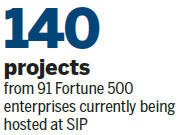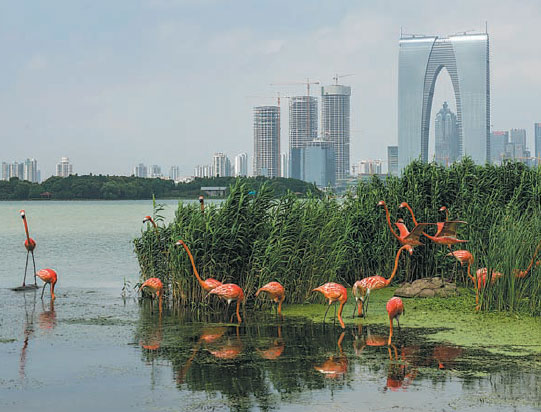As SIP looks to upgrade, experts offer dos and don'ts
|
The industrial park offers favorable policies to attract companies from home and abroad. |
The Singapore-China Suzhou Industrial Park, a regional manufacturing hub, is making efforts to upgrade its traditional manufacturing sectors, experts said.
But to accomplish this, Cheng Yung-nien, head of the Institute of Eastern Asian Studies at the National University of Singapore, said it is essential to avoid extremes when making decisions in policy.
"One extreme is not upgrading facilities and production methods; another extreme is to replace real economies with Internet-based technologies and financing.
"The SIP has a good foundation for several sectors, such as the pharmaceutical, mechanical engineering and robotics industries. It is necessary for SIP to continue to develop these sectors," said Cheng.
The SIP is host to more than 140 projects from 91 Fortune 500 enterprises, six of which have investments of more than 1 billion yuan each, according to the SIP administrative committee.

Wang Liming, executive vice-president and professor at Renmin University, said it is vital for SIP to take a leading role in creating an environment that favors innovations by protecting intellectual property rights.
"The SIP should look for talents, especially innovators and innovation-driven entrepreneurs who want a lot of IPR protection. For high-end manufacturing and R&D-driven enterprises, answering their calls for IPR protection is vital," said Wang.
Li Guanghui, vice-president of the Chinese Academy of International Trade and Economic Cooperation, a think tank for the Ministry of Commerce, said the key for upgrading industries is to build complete supply and value chains.
"Making complete supply and value chains does not mean putting several companies into the same corner and naming the area a robotics park. It takes research of existing companies and offering strong incentives to firms to create links between R&D, processing, marketing and other important functions," said Li.
He added that SIP should consider cooperating with neighboring programs, such as the China (Shanghai) Piloted Free Trade Zone.
(China Daily 02/03/2016 page12)















